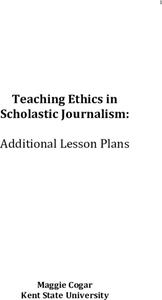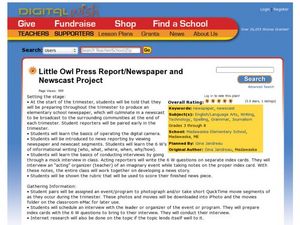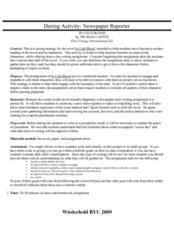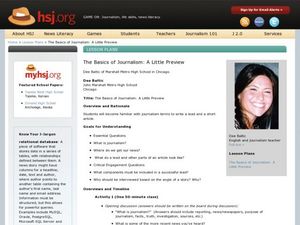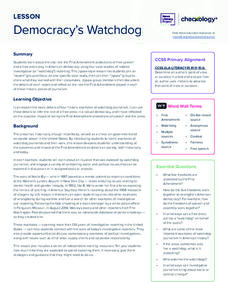Pulitzer Center
The Paradise Papers: A Lesson in Investigative Journalism
The Paradise Papers, a year-long research project from the International Consortium of Investigative Journalism (ICIJ) exposed how political leaders, business people, and wealthy individuals used offshore entities to avoid taxes and hide...
Curated OER
Hometown Travel Journalism
Steinbeck’s witty memoir, “Travels with Charley: In Search of America,” inspires kids to investigate their neighborhoods as local travel journalists.
Benjamin Franklin Tercentenary
Franklin’s Fair Hand American Journalism
Scholars know him for his role in the American Revolution, but Ben Franklin was also a journalist and printer. Learners investigate his standards for what was fit to print using primary sources—including writings where Franklin explains...
PBS
Journalism in War Time: What Does the Public Need to Know?
A viewing of the documentary War Feels Like War, launches an exploration of the importance of accurate and comprehensive war reporting. Groups investigate various news agencies and assess the factors that influence their stories. A...
School Journalism
Investigative and Data Journalism – Day One
A free press, free to investigate and report on responsibly, compelling stories, is essential to a democracy. A 10-slide presentation details where to get ideas, how to go about an investigation, gather data, and assure the accuracy of...
Curated OER
Investigative Journalism
Students choose newsworthy topics to research and investigate, narrow focus of investigation, get information from the source through interviews, write stories, and submit to media outlets.
iCivics
Lesson 1: Journalism
Extra! Extra! Do your pupils know what it takes to be a good journalist? Young news hounds explore the world of journalism through a series of activities that focus on ethical reporting. Learners read, evaluate, and investigate popular...
Teaching Tolerance
Journalism for Justice
Roll the presses! Or at least have your class members participate in the time-honored tradition of the student press by creating their own newspapers or journalist pieces on a social problem. After conducting research and collaborating...
School Journalism
Investigative and Data Journalism – Day Two
Class members use the Investigative Reporting Article Planner they completed the first day of the unit to guide the development of an infographic that displays what they have learned about the topic they researched.
Kent State University
Teaching Ethics in Scholastic Journalism
Events in recent years have underscored the importance of a free and independent press in a democracy. Young journalists engage in lessons about the function of journalism in a democratic society, practice the steps of Bok's Ethical...
Curated OER
News Journalism Across the Media: Introduction
Although learners are aware of news as information that influences their perceptions of the world, they are often unaware of the various ways to present that information. Encourage them to investigate, discuss, analyze and make valuable...
PBS
Facts vs. Opinions vs. Informed Opinions and their Role in Journalism
Do reporters write about what they see, or what they think? Examine the differences between investigative writing and opinion writing with a activity from PBS. Learners look over different examples of each kind of reporting, and convince...
National Endowment for the Humanities
“Read All About It”: Primary Source Reading in “Chronicling America”
Can investigative journalism become too sensationalistic and accusatory, or is it vital for the survival of a democracy? Middle schoolers analyze primary source documents from early 20th-century newspapers as well as Theodore...
Curated OER
Little Owl Press Report/Newspaper and Newscast Project
Discover journalistic techniques by having learners prepare and write their own class newspaper. They discuss the five W's of investigative journalism and conduct interviews with school figures. They utilize video technology, podcast...
Facing History and Ourselves
Social Media and Ferguson
How can social media help or hinder civil dialogue? How can information shared on social media be verified? As the investigation of media reports of the events surrounding the shooting of Michael Brown continues, class members read...
News Literacy Project
News Goggles: Lionel Ramos, Oklahoma Watch
Given all the recent criticism of the news media and coverage, it's crucial that young people are given the tools they need to evaluate what they see, hear, and read about current events. A video interview from "News Goggles" introduces...
Curated OER
In Cold Blood: A During Reading Activity
Following the method used by Truman Capote, class members research a major character from his novel, In Cold Blood, and then conduct an interview with that character. The resulting research is used to craft a newspaper article about the...
Curated OER
CSI: Chemistry Student Investigators
Pupils study chemistry. In this laboratory lesson plan students watch the CSI episodes and investigate their laboratory techniques and discuss what they saw.
Curated OER
Investigative Reporting: Module 3 'On Assignment'
Students choose and create an investigative journalism piece. In this journalism writing lesson, students work in groups to develop and investigative television show. The end result is for students to create a video with a 40 minute run...
Curated OER
The Basics of Journalism: A Little Preview
Students define journalism and identify the basic components of a news story. In this journalism basics lesson, students define the word journalism, read a new story, and break it into parts with two major characteristics for each...
News Literacy Project
Democracy’s Watchdog
As part of a study of the importance of the First Amendment, expert groups research different historic case studies of investigative reporting, and then the experts share their findings with jigsaw groups. The case studies include Nellie...
Newseum
The Making of Fake News: A Case Study
"Fake News" (stories that are entirely fabricated/fictional) is the subject of a case study of the search for Jestin Coler, the creator of some of the most famous fake news stories. After reading NPR's investigative report, scholars...
Newseum
Reporting Part II: Beyond the Basics
Scholars examine the articles written for the series' first lesson and select ones that would benefit from further research. In a 48-hour deadline, teams of three select one topic to investigate in greater depth and craft a revised...
Curated OER
Yellow Journalism
Seventh graders investigate yellow journalism and how it affected public opinion and the government during the Spanish American War. They define key vocabulary words, and take notes during a teacher-led lecture. In pairs they read...











